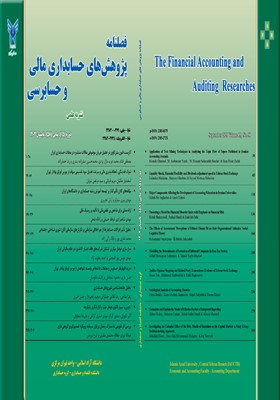Modelling the Determinants of Formation of Informal Companies in Iran Tax System
Subject Areas :
Mehdi Mousapour Lafmejani
1
,
Ahmad Yaghoubnehad
2
1 - Department of Accounting, Central Tehran Branch, Islamic Azad University, Tehran, Iran
2 - Department of Accounting, Central Tehran Branch, Islamic Azad University, Tehran, Iran, Correspond Author,
Received: 2023-04-03
Accepted : 2023-06-10
Published : 2023-06-22
Keywords:
Keywords: Economic Incentives,
Informal Companies,
Tax System. Structural Equations,
Abstract :
Abstract
There is a problem called formal and paper companies that has been plaguing economic activists across the country for some time. These companies exist, but others benefit from them.The purpose of this study is to present a model of factors affecting the formation of paper companies in the country's tax system.Methodologically, this research is considered in the category of mix method, because two groups of participants were present in the form of qualitative and quantitative sections. In this study, a questionnaire and the method of structural equations were used. The results in a quantitative part in the form of presenting the model of this research showed that the use of foreign exchange tariffs by creating face to face in capital is the most effective factor for the development and formation of face-to-face companies in the country's tax system. According to the presented model, it is possible to identify fictitious companies to an acceptable extent and help to eliminate them and increase the transparency of the economy.
References:
فهرست منابع
بلوری، امین، محمد مرادی و حمیدرضا یزدانی، (1399)، "طراحی مدل فرار مالیاتی بر پایه مالیات بر درآمد: رویکرد نظریه داده بنیاد"،دو فصلنامه علمی حسابداری دولتی، 7(1)، صص 30-9.
پور زمانی، زهرا، فرخ عسکری و ابوالقاسم محمد نژاد عالی زمینی، (1397)، "تأثیر شرکتهای کاغذی بر ریسک حسابرسی مالیات بر ارزشافزوده ( VAT)"، پژوهشنامه مالیات، ۲۶ (۴۰) ، صص ۱۱۷-۱۳۳.
حسنزاده، بهرام، (1395)، "تأملی بر علل ایجاد شرکتهای فاقد اعتبار از منظر ثبت شرکتها"، پژوهشنامه حقوق خصوصی عدالت، 3(5)، صص 28-11.
خباز زاده، محمد اسماعیل و آزیتا جهانشاد، (1399)، "نسبتهای سودآوری و ویژگیهای مودیان در سیستم حسابرسی مالیات بر ارزشافزوده مبتنی بر ریسک"، پژوهشهای حسابداری مالی و حسابرسی، 12(46)، صص 132-162.
ملکیان، اسفندیار و سروه فرزاد، (1396)، "تأثیر حسابرسی مالیاتی بررابطه بین مالیات ابرازی، تشخیصی و قطعی: مطالعه موردی استانهای آذربایجان شرقی، غربی و شرق و جنوب تهران"، پژوهشهای حسابداری مالی و حسابرسی، 9(33)، صص 51-64.
درگاهی، مسعود، (۱۳۹۴)، "بررسی عملکرد، چالشها و مشکلات اجرای آزمایشی قانون مالیات بر ارزشافزوده"، پایاننامه کارشناسی ارشد، دانشکده مدیریت، دانشگاه آزاد اسلامی، واحد تهران مرکزی.
عامری، ریحانه، سمیرا اصغری، فرزانه مجد آبادی و حسین علی پور، (۱۳۹۸)، "چالشهای استفاده از کارت بازرگانی اشخاص دیگر در نظام حقوق مالیاتی ایران(با نگرشی به سیاستهای تقنینی و اجرایی)"، پژوهشنامه مالیات (نشریه علمی)، ۲۷(۴۳)، صص 54-35.
_||_
Aggarwal, V. & Dharni, K. (2020), “Deshelling the Shell Companies Using Benford’s Law: An Emerging Market Study”, Vikalpa. , 45(3), PP. 160-169.
Allred, B. B. Findley, M. G. Nielson, D. , & Sharman, J. C. (2017), “Anonymous Shell Companies: A Global Audit Study and Field Experiment in 176 Countries”, Journal of International Business Studies, 48(5), PP. 596-619.
Araujo, J.P. & Rodrigues, M. (2016), “Taxation, Credit Constraints and the Informal Economy”, Economi A, (1)17, PP. 43-55.
Aydogdu, M. , Shekhar, C. , & Torbey, V. (2007), “Shell Companies as IPO Alternatives: an Analysis of Trading Activity around Reverse Mergers”, Applied Financial Economics, 17(16), PP. 1335-1347.
Bambani, R. (2015), “Shell Corporations and thir Role in International Fraud”, Bachelor Thesis. Thesis Supervisor: Prof. Dr. Bauke Visser, PP. 1-27.
Gupta, A. (2018), “Shell Companies: A Defunct. Freedom of Speech”, PP. 67-71.
Jancsics, D. (2018), “Shell Companies and Government Corruption”, In Global Encyclopedia of Public Administration, Public Policy, and Governance, PP. 4-21.
Krišto,L. K & Thirion, E (2018), “An Overview of Shell Companies in the European Union”, Ex-Post Evaluation Unit and European Added Value Unit PE 627, 129, PP. 1-43.
Lejour, A. , Möhlmann, J. , van't Riet, M. , & Benschop, T. (2019), “Dutch Shell Companies and International Tax Planning”, PP.
Shukla, J. (2018), “Critical Analysis of Trading Through Shell Companies”, International Journal of Research in Engineering, Science and Management Vol. 1, Issue 9, PP. 475-477.


